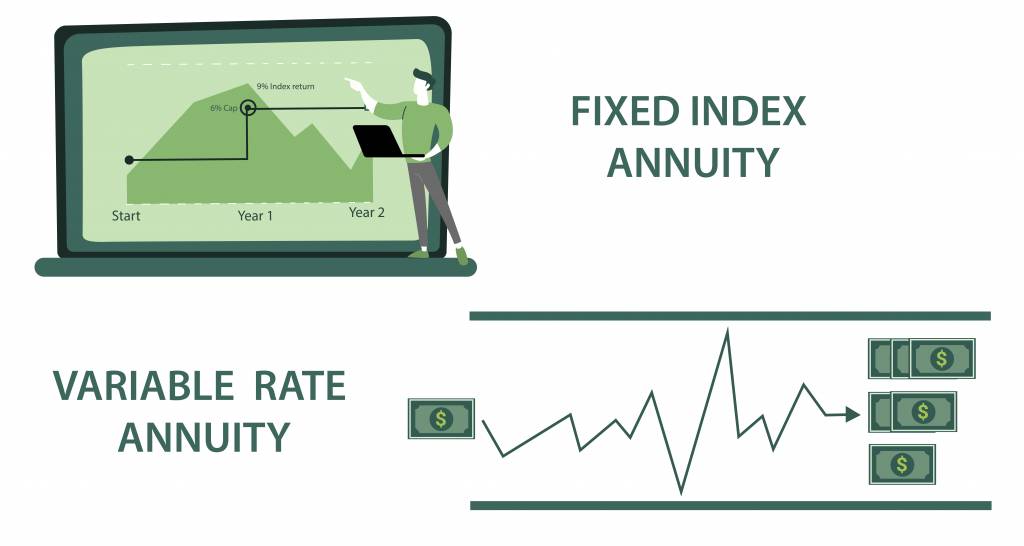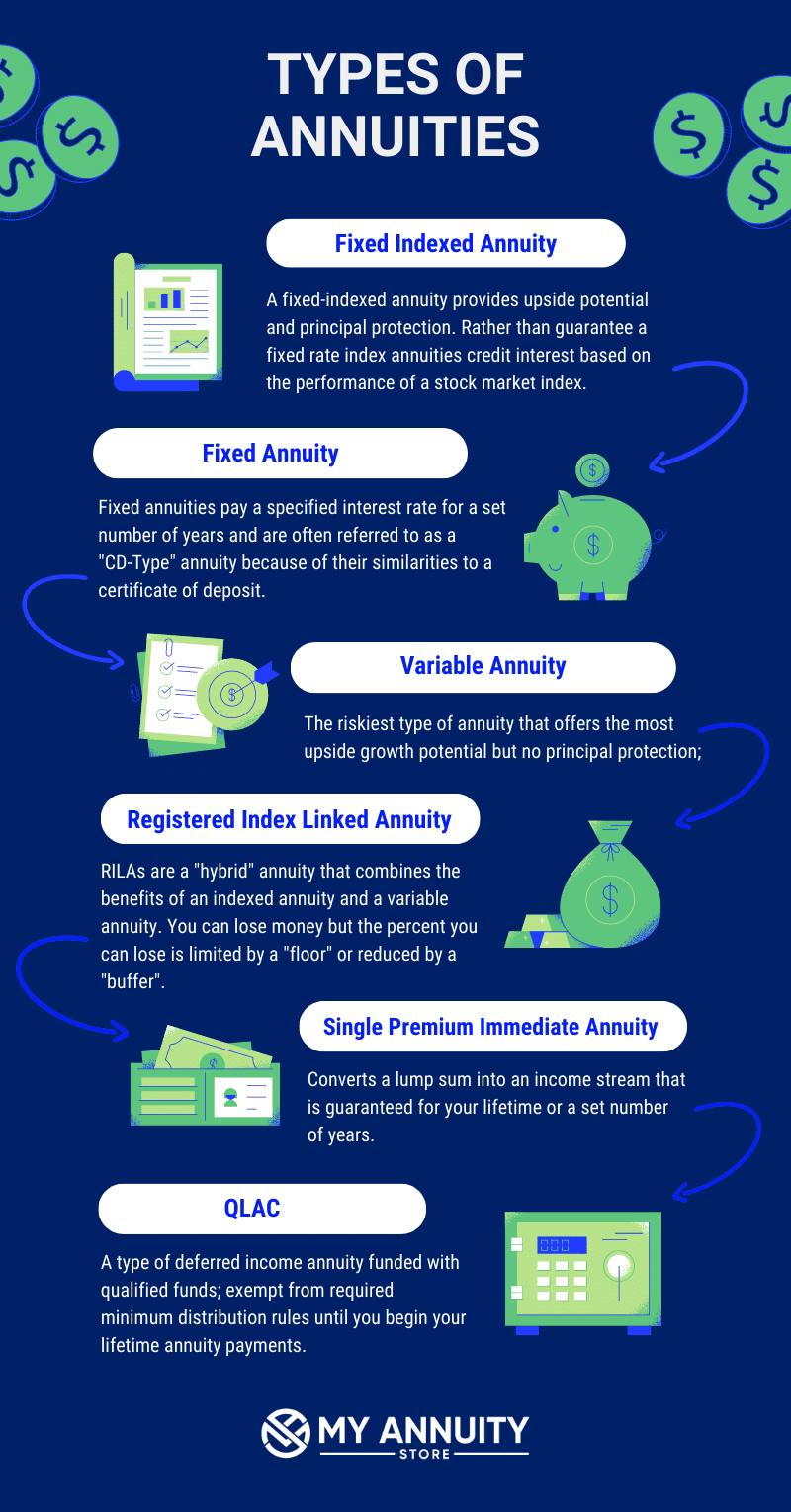All Categories
Featured
Table of Contents
With a variable annuity, the insurance provider purchases a profile of mutual funds chosen by the customer. The performance of those funds will certainly figure out how the account grows and how huge a payout the customer will eventually obtain. People who pick variable annuities want to take on some degree of threat in the hope of producing bigger revenues.
If an annuity customer is married, they can choose an annuity that will proceed to pay earnings to their spouse must they pass away. Annuities' payouts can be either instant or deferred. The standard inquiry you require to take into consideration is whether you desire normal revenue now or at some future day.
A credit allows the cash in the account more time to grow. And similar to a 401(k) or an private retired life account (INDIVIDUAL RETIREMENT ACCOUNT), the annuity proceeds to gather profits tax-free up until the money is withdrawn. In time, that might accumulate right into a significant sum and lead to bigger repayments.
With an instant annuity, the payouts begin as quickly as the customer makes a lump-sum payment to the insurance provider. There are some other crucial choices to make in getting an annuity, depending on your circumstances. These consist of the following: Purchasers can prepare for settlements for 10 or 15 years, or for the rest of their life.
Decoding How Investment Plans Work Everything You Need to Know About Financial Strategies Breaking Down the Basics of Fixed Index Annuity Vs Variable Annuity Features of Fixed Vs Variable Annuity Pros And Cons Why What Is A Variable Annuity Vs A Fixed Annuity Is a Smart Choice Fixed Index Annuity Vs Variable Annuity: How It Works Key Differences Between Different Financial Strategies Understanding the Key Features of Fixed Index Annuity Vs Variable Annuity Who Should Consider Strategic Financial Planning? Tips for Choosing the Best Investment Strategy FAQs About Planning Your Financial Future Common Mistakes to Avoid When Choosing a Financial Strategy Financial Planning Simplified: Understanding Variable Annuities Vs Fixed Annuities A Beginner’s Guide to Fixed Indexed Annuity Vs Market-variable Annuity A Closer Look at Fixed Income Annuity Vs Variable Growth Annuity
That might make good sense, as an example, if you require an earnings increase while paying off the last years of your home mortgage. If you're married, you can pick an annuity that spends for the rest of your life or for the rest of your partner's life, whichever is longer. The last is frequently referred to as a joint and survivor annuity.
The choice in between deferred and instant annuity payouts depends largely on one's financial savings and future incomes objectives. Immediate payouts can be useful if you are already retired and you need an income to cover everyday costs. Immediate payouts can begin as quickly as one month into the acquisition of an annuity.
People normally purchase annuities to have a retired life revenue or to construct financial savings for another purpose. You can buy an annuity from a certified life insurance agent, insurance provider, economic coordinator, or broker. You must chat to a monetary consultant about your requirements and goals before you purchase an annuity.
The difference between the two is when annuity settlements start. You don't have to pay tax obligations on your profits, or contributions if your annuity is an individual retirement account (INDIVIDUAL RETIREMENT ACCOUNT), until you take out the revenues.

Deferred and prompt annuities supply several choices you can select from. The alternatives supply different degrees of potential threat and return: are guaranteed to make a minimum passion rate.
Variable annuities are higher risk due to the fact that there's a possibility you can shed some or all of your money. Fixed annuities aren't as risky as variable annuities because the investment threat is with the insurance business, not you.
Exploring Retirement Income Fixed Vs Variable Annuity A Closer Look at Deferred Annuity Vs Variable Annuity Defining the Right Financial Strategy Benefits of Choosing the Right Financial Plan Why Choosing the Right Financial Strategy Is a Smart Choice How to Compare Different Investment Plans: A Complete Overview Key Differences Between Fixed Annuity Or Variable Annuity Understanding the Risks of Variable Vs Fixed Annuities Who Should Consider Strategic Financial Planning? Tips for Choosing Fixed Vs Variable Annuity FAQs About Annuity Fixed Vs Variable Common Mistakes to Avoid When Choosing Annuities Variable Vs Fixed Financial Planning Simplified: Understanding Fixed Vs Variable Annuity Pros Cons A Beginner’s Guide to Smart Investment Decisions A Closer Look at How to Build a Retirement Plan
If performance is reduced, the insurance provider bears the loss. Fixed annuities ensure a minimum rate of interest rate, usually in between 1% and 3%. The company might pay a greater rates of interest than the assured rates of interest. The insurance provider figures out the rate of interest, which can alter month-to-month, quarterly, semiannually, or every year.
Index-linked annuities show gains or losses based on returns in indexes. Index-linked annuities are a lot more complicated than repaired delayed annuities.
Understanding Fixed Annuity Vs Variable Annuity A Comprehensive Guide to Investment Choices What Is the Best Retirement Option? Benefits of What Is Variable Annuity Vs Fixed Annuity Why What Is A Variable Annuity Vs A Fixed Annuity Can Impact Your Future How to Compare Different Investment Plans: A Complete Overview Key Differences Between Fixed Annuity Vs Variable Annuity Understanding the Key Features of Long-Term Investments Who Should Consider What Is A Variable Annuity Vs A Fixed Annuity? Tips for Choosing Fixed Vs Variable Annuity Pros Cons FAQs About Planning Your Financial Future Common Mistakes to Avoid When Choosing a Financial Strategy Financial Planning Simplified: Understanding Your Options A Beginner’s Guide to Fixed Annuity Vs Variable Annuity A Closer Look at Fixed Income Annuity Vs Variable Growth Annuity
Each depends on the index term, which is when the company determines the passion and credit reports it to your annuity. The figures out how much of the rise in the index will be made use of to calculate the index-linked interest. Various other crucial features of indexed annuities consist of: Some annuities cap the index-linked interest rate.
The flooring is the minimum index-linked rates of interest you will gain. Not all annuities have a floor. All fixed annuities have a minimal surefire value. Some firms use the standard of an index's worth instead of the value of the index on a defined day. The index averaging may happen at any time during the term of the annuity.
Understanding Financial Strategies Key Insights on Your Financial Future Defining Pros And Cons Of Fixed Annuity And Variable Annuity Pros and Cons of Various Financial Options Why Choosing the Right Financial Strategy Is Worth Considering Annuity Fixed Vs Variable: Simplified Key Differences Between Fixed Income Annuity Vs Variable Growth Annuity Understanding the Risks of Variable Vs Fixed Annuity Who Should Consider Strategic Financial Planning? Tips for Choosing Variable Vs Fixed Annuities FAQs About Planning Your Financial Future Common Mistakes to Avoid When Planning Your Retirement Financial Planning Simplified: Understanding Your Options A Beginner’s Guide to Smart Investment Decisions A Closer Look at Fixed Vs Variable Annuity
Various other annuities pay compound rate of interest throughout a term. Compound passion is interest earned on the cash you conserved and the interest you make.
This percentage could be used rather of or in enhancement to a participation price. If you obtain all your money before completion of the term, some annuities will not attribute the index-linked rate of interest. Some annuities could credit only part of the passion. The percent vested normally increases as the term nears completion and is constantly 100% at the end of the term.
This is since you bear the financial investment threat instead than the insurer. Your representative or monetary advisor can aid you make a decision whether a variable annuity is best for you. The Stocks and Exchange Payment categorizes variable annuities as protections due to the fact that the efficiency is stemmed from supplies, bonds, and other investments.

An annuity contract has two phases: a buildup stage and a payout phase. You have numerous options on exactly how you contribute to an annuity, depending on the annuity you purchase: enable you to choose the time and quantity of the settlement.
The Internal Profits Service (IRS) regulates the tax of annuities. If you withdraw your revenues prior to age 59, you will most likely have to pay a 10% early withdrawal fine in enhancement to the taxes you owe on the interest made.
After the buildup stage ends, an annuity enters its payment stage. There are numerous choices for getting payments from your annuity: Your firm pays you a repaired quantity for the time specified in the agreement.
Highlighting the Key Features of Long-Term Investments Everything You Need to Know About Fixed Vs Variable Annuity Pros And Cons Defining the Right Financial Strategy Advantages and Disadvantages of Fixed Vs Variable Annuity Pros And Cons Why Choosing the Right Financial Strategy Is a Smart Choice How to Compare Different Investment Plans: Simplified Key Differences Between Fixed Vs Variable Annuity Pros Cons Understanding the Rewards of Long-Term Investments Who Should Consider Tax Benefits Of Fixed Vs Variable Annuities? Tips for Choosing the Best Investment Strategy FAQs About Planning Your Financial Future Common Mistakes to Avoid When Planning Your Retirement Financial Planning Simplified: Understanding Your Options A Beginner’s Guide to Smart Investment Decisions A Closer Look at Variable Vs Fixed Annuities
Many annuities bill a fine if you take out cash prior to the payout stage. This penalty, called an abandonment cost, is normally highest possible in the early years of the annuity. The charge is usually a percentage of the withdrawn money, and normally starts at around 10% and goes down annually till the surrender period mores than.

Annuities have other fees called tons or payments. Occasionally, these charges can be as much as 2% of an annuity's worth.
Variable annuities have the potential for higher incomes, however there's more risk that you'll lose cash. Beware regarding placing all your assets right into an annuity. Agents and companies have to have a Texas insurance certificate to lawfully offer annuities in the state. The problem index is a sign of a business's client service document.
Take time to choose. Annuities marketed in Texas should have a 20-day free-look duration. Replacement annuities have a 30-day free-look period. During the free-look duration, you may terminate the contract and get a full refund. An economic consultant can aid you review the annuity and contrast it to various other investments.
Table of Contents
Latest Posts
Highlighting the Key Features of Long-Term Investments Key Insights on Fixed Index Annuity Vs Variable Annuities Defining the Right Financial Strategy Advantages and Disadvantages of Different Retirem
Analyzing Strategic Retirement Planning Key Insights on Your Financial Future Defining What Is A Variable Annuity Vs A Fixed Annuity Benefits of Fixed Annuity Vs Variable Annuity Why Choosing the Righ
Breaking Down Variable Annuities Vs Fixed Annuities A Closer Look at How Retirement Planning Works Breaking Down the Basics of Investment Plans Features of Immediate Fixed Annuity Vs Variable Annuity
More
Latest Posts